
Harvard Referencing Generator
Powered by chegg.
- Select style:
- Archive material
- Chapter of an edited book
- Conference proceedings
- Dictionary entry
- Dissertation
- DVD, video, or film
- E-book or PDF
- Edited book
- Encyclopedia article
- Government publication
- Music or recording
- Online image or video
- Presentation
- Press release
- Religious text
What is the Harvard Referencing System?
The Harvard style is a system that students, writers and researchers can use to incorporate other people’s quotes, findings and ideas into their work. This is done in order to support and validate their conclusions without breaching any intellectual property laws. The popular Harvard format is typically used in assignments and publications for humanities as well as natural, social and behavioural sciences.
It is a parenthetical referencing system that is made up of two main components:
- In-text references including the author’s surname and the year of publication should be shown in brackets wherever another source has contributed to your work
- A reference list outlining all of the sources directly cited in your work
While in-text references are used in the Harvard referencing system to briefly indicate where you have directly quoted or paraphrased a source, your reference list is an alphabetised list of complete references that enables your reader to locate each source with ease. Each entry should be keyed to a corresponding parenthetical reference in the main body of your work so that a reader can take an in-text citation and quickly retrieve the source from your reference list.
Note that some universities, and certain disciplines, may also require you to provide a bibliography. This is a detailed list of all of the material you have consulted throughout your research and preparation, and it will demonstrate the lengths you have gone to in researching your chosen topic.
‘Harvard referencing’ is an umbrella term for any referencing style that uses the author name and year of publication within the text to indicate where you have inserted a source. This author-date system appeals to both authors and readers of academic work. Scholars find the format an economical way of writing, and it is generally more accessible to the reader as there are no footnotes crowding the page. Only the name of the author, the publication date of the source and, if necessary, the page numbers are included in parenthetical references, for example:
(Joyce, 2008).
Use the Cite This For Me Harvard referencing generator to create your fully-formatted in-text references and reference list in the blink of an eye.
Popular Harvard Referencing Examples
- Chapter of a book
- Conference proceedings
- Court case
- Dissertation
- Encyclopedia article
- Image online or video
- Presentation or lecture
- Video, film, or DVD
Cite This For Me Harvard Referencing Guide
Not sure how to format your Harvard references, what references are, or simply curious about the Cite This For Me Harvard referencing tool? Our guide can answer your questions and offer you a comprehensive introduction to the style. (Note that Cite This For Me is not officially associated with the style.)
Sometimes, students do not encounter referencing until they embark onto degree-level studies, yet it is a crucial academic skill that will propel you towards establishing yourself in the academic community. So, if you need a helping hand with your referencing then why not try the Cite This For Me Harvard referencing generator? The Cite This For Me automated referencing generator accesses knowledge from across the web, assembling all of the relevant information into a formatted reference list that clearly presents all of the sources that have contributed to your work. Using this citation generator to cite your sources enables you to cross the finish line in style.
It is important to bear in mind that there is a plethora of different referencing styles out there – the use of any particular one depends on the preference of your university, subject, professor or the publication you are submitting the work to. If you’re unsure which style you should be using, consult your tutor and follow their guidelines. The Cite This For Me Harvard referencing generator above will create your references in the Harvard – Cite Them Right (10th Edition) format as standard, but it can auto-generate references in 7,000+ styles. So, whether your professor has asked you to adopt APA referencing , or your discipline requires you to use OSCOLA referencing , Vancouver or MLA , we have the style you need. To accurately create references in a specific format, simply sign up to Cite This For Me and select your chosen style.
Are you struggling with referencing an unfamiliar source type? Or feeling confused about whether to cite a piece of common knowledge? Our Harvard reference generator and this guide will help provide you with everything you need to get both your parenthetical references and reference list completed quickly and accurately.
Why do I Need to Reference?
Referencing can be a confusing task, especially if you are new to the concept, but it’s essential. Simply put, referencing is the citing of sources you have utilised to support your essay, research, conference, article etc. Even if you are using the Cite This For Me Harvard referencing tool, understanding why you need to reference will go a long way in helping you to naturally integrate the process into your research and writing routine.
Firstly, whenever another source contributes to your work you must give the original author the appropriate credit in order to avoid plagiarism, even when you have completely reworded the information. The only exception to this rule is common knowledge – e.g., London is the capital city of England. Whilst plagiarism is not always intentional, it is easy to accidentally plagiarise your work when you are under pressure from imminent deadlines, you have managed your time ineffectively, or if you lack confidence when putting ideas into your own words. The consequences can be severe; deduction of marks at best, expulsion from university or legal action from the original author at worst. Find out more here.
This may sound overwhelming, but plagiarism can be easily avoided by citing your sources and carrying out your research and written work thoughtfully and responsibly. Use the Cite This For Me Harvard referencing generator to do so! We have compiled a handy checklist to follow whilst you are working on an assignment.
How to avoid plagiarism:
- Formulate a detailed plan – carefully outline both the relevant content you need to include, as well as how you plan on structuring your work
- Manage your time effectively – make use of time plans and targets, and give yourself enough time to read, write and proofread
- Keep track of your sources – record all of the relevant publication information as you go (e.g., If you are referencing a book you should note the author or editor’s name(s), year of publication, title, edition number, city of publication, name of publisher). Carefully save each quote, word-for-word, and place it in inverted commas to differentiate it from your own words
- When you are paraphrasing information, make sure that you use only your own words and a sentence structure that differs from the original text
- Save all of your research and references in a safe place – organise and manage your references using the Cite This For Me Harvard referencing generator.
Secondly, proving that your writing is informed by appropriate academic reading will enhance your work’s authenticity. Academic writing values original thought that analyses and builds upon the ideas of other scholars. It is therefore important to use a Harvard referencing generator to accurately signpost where you have used someone else’s ideas. This will show your reader that you have delved deeply into your chosen topic and supported your thesis with expert opinions.
Here at Cite This For Me we understand how precious your time is. This is why we created the Cite This For Me referencing tool and Harvard referencing guide to help relieve the unnecessary stress of referencing.
Harvard Referencing Guidelines by School
- Anglia University Harvard Referencing
- Bournemouth University Harvard Referencing
- Cardiff University Harvard Referencing
- Coventry University Harvard Referencing
- DMU Harvard Referencing
- Edge Hill University Harvard Referencing
- Imperial College University Harvard Referencing
- Leeds University Harvard Referencing
- LSBU Harvard Referencing
- MMU Harvard Referencing
- SHU Harvard Referencing
- Staffordshire University Harvard Referencing
- UCA Harvard Referencing
- UWE Harvard Referencing
- UWS Harvard Referencing
- Wolverhampton University Harvard Referencing
How do I Create and Format Harvard Style In-text References?
When adopting Harvard style referencing in your work, if you are inserting a quote, statement, statistic or any other kind of source information into the main body of your essay you should:
- Provide the author’s surname and date of publication in brackets right after the taken information or at the end of the sentence.
There are many assumptions when it comes to the information processing approach to cognition… (Lutz and Huitt, 2004).
- If you have already mentioned the author in the sentence, you should enter only the year of publication in brackets directly after where the author’s surname is mentioned.
In the overview of these developmental theories, Lutz and Huitt (2004) suggest that…
- If you are quoting a particular section of the source (rather than the entire work), you should also include a page number or page range within the brackets after the date.
“…the development of meaning is more important than the acquisition of a large set of knowledge or skills …” (Lutz and Huitt, 2004, p. 8), which means that …
- Note that if the source has four or more authors, you do not need to write out all of their surnames; simply use the first author’s surname followed by the abbreviation ‘et al.’ (meaning ‘and others’) in italics.
As well as saving you valuable time, the Cite This For Me Harvard referencing tool will enable you to easily avoid common referencing errors.
How Do I Format My Harvard Style Reference List?
The brief in-text Harvard references in your work should directly link to your reference list. Utilising and building on a wide range of relevant sources is a guaranteed way of impressing your reader, and a comprehensive list of the source material you have used is the perfect platform to exhibit your research efforts.
Follow these Harvard referencing guidelines when compiling your reference list:
- Start your reference list on a new page at the end of your document
- Use ‘Reference List’ as the heading
- Copy each of your full-length references from the Harvard referencing tool into a list
- Arrange the list in alphabetical order by the author’s last name (titles with no author are alphabetised by the work’s title, and if you are citing two or more sources by the same author they should be listed in chronological order of the year of publication)
- General formatting should be in keeping with the rest of your work
- Italicise titles of books, reports, conference proceedings etc. For journal articles, the title of the journal should be printed in italics, rather than the title of the journal article
- Capitalise the first letter of the publication title, the first letters of all main words in the title of a journal, and all first letters of a place name and publisher
As a general rule a Harvard reference list includes every source that you have cited in your work, whilst a bibliography also contains any relevant background reading which you have consulted (even those sources that are never mentioned in the narrative). Your bibliography should start on its own page, with the same formatting as the rest of the paper and aligned to the left with the sources listed alphabetically. You may be required to provide a bibliography as well as a reference list, so check this with your tutor.
Reference list / bibliography examples:
- Book, one author:
Martin, K. (2019) The queen of hearts . New York: Berkley.
- Edited book with a chapter written by an author:
Mooney, L.R. (2011) ‘Vernacular literary manuscripts and their scribes’, in Gillespie, A. and Wakelin, D. (eds.) The production of books in England 1350-1500 . New York: Cambridge University Press, pp. 192-211.
- One author, book, multiple editions:
Hawking, S.W. (1998) A brief history of time: From the big bang to black holes . 10th edn. New York: Bantam Doubleday Dell Publishing Group.
If all information resembles a book, use the template for a book reference.
If a page number is unavailable, use chapter number. URL links are not necessary, but can be useful. When including a URL, include the date the book was downloaded at the end of the reference:
Available at: URL (Downloaded: DD Month YYYY)
- More than three authors, journal article:
Shakoor, S., Jaffee, S.R., Bowes, L., Ouellet-Morin, l., Andreou, P., Happé, F., Moffitt, T.E. and Arseneault, L. (2011) ‘A prospective longitudinal study of children’s theory of mind and adolescent involvement in bullying’, Journal of Child Psychology and Psychiatry , 53(3), pp. 254–261. doi: 10.1111/j.1469-7610.2011.02488.x.
- Conference papers:
Drogen, E. (2014) ‘Changing how we think about war: The role of psychology’, The British Psychological Society 2014 annual conference . The ICC, Birmingham British Psychological Society, 07-09 May 2014.
- Web pages with one author:
Raiford, T. (2015) 20 amazing dog breeds from England . Available at https://puppytoob.com/ (Accessed: 6 November 2019).
If your web page is missing a date of publication, or information about when it was last updated, place (no date) directly after the author’s name. Make sure to include the accessed date at the end of the reference.
Butterfield, L. (2019) ‘Research spotlight: I want to get high enough up the chain to pull others over the wall with me’, Oxford science blog , 1 November. Available at: http://www.ox.ac.uk/news/science-blog (Accessed 5 November 2019).
When referencing blog posts, the year of publication is placed in parentheses directly after the author of the posting. The day and month of publication are placed in the reference after the title of the blog site. Make sure to include the accessed date at the end of the reference as well.
If the author uses a pseudonym, use it in in the author’s position. Do not attempt to seek out the author’s full name. Remember, the goal of a reference to make it simple for the reader of your work to seek out the source for themselves.
- Social Media Posts:
Whilst scholarly, peer-reviewed journal articles, books, conference papers, and research reports are considered high-quality source materials, it is not uncommon to come across social media posts featured and discussed in projects. Facebook, Twitter, and Instagram provide easy access to information on a number of personally owned devices. In addition, they promote interaction among its participants, thus allowing for deliberation and debate.
When creating a reference for a social media post, it is recommended to include the main URL of the social media platform, not the URL of the individual post. This prevents readers from clicking on links that may lead to a blocked post behind a private account.
Do not include the content of the individual post in the full reference. If the reader strives to see the contents of the post in its entirety, the information provided in both the text and on the final page of the project provide enough information for the reader to locate it on their own.
John, E. (2019) [ Facebook ] 31 October. Available at: https://www.facebook.com/EltonJohn/ (Accessed 12 November 2019).
Rushdie, S. (2019) [ Twitter ] 10 October. Available at: https://twitter.com/SalmanRushdie (Accessed 2 November 2019).
Are you struggling to find all of the publication information to complete a reference? Did you know that our Harvard reference generator can help you do it?
Time is of the essence when you’re finishing a paper, but there’s no need to panic because you can compile your reference list using the Cite This For Me Harvard referencing generator. Sign in to your Cite This For Me account to save and export your reference list.
Harvard Style Formatting Guidelines
Accurate referencing doesn’t only help protect your work from plagiarism – presenting your source material in a consistent and clear way also enhances the readability of your work. Closely follow the Harvard referencing system’s formatting rules on font type, font size, text-alignment and line spacing to ensure that your work is easily legible. Before submitting your work check that you have formatted your whole paper – including your reference list – according to the style’s formatting guidelines.
How to format in Harvard:
- Margins: 2.5cm on all sides
- Suggested fonts: Times New Roman, Arial and Courier New for Windows; Times New Roman, Helvetica and Courier for Mac, 12pt size. Ensure that all references are in the same font as the rest of the work
- Shortened title followed by the page number in the header, aligned to the right
- Double-space the entirety of the paper
- ½ inch indentation for every new paragraph (press tab bar)
- Unlike other popular reference styles, this particular style does not call for a hanging indent for the second and any subsequent lines of references. Instead, this style requires all lines to sit flush against the left margin.
- Reference list on a separate page at the end of the body of your work. If your professor requests a bibliography too (a list of sources that were used to help gain background knowledge on the topic), it can be placed at the end of the assignment as well.
Even when using a Harvard referencing generator, always check with your professor for specified guidelines – there is no unified ‘Harvard Style’ for the formatting of a paper.
A Brief History of the Harvard Style
The author-date system is attributed to eminent zoologist Edward Laurens Mark (1847-1946), Hersey professor of anatomy and director of Harvard’s zoological laboratory. It is widely agreed that the first evidence of the citation style can be traced back to Mark’s landmark cytological paper (Chernin, 1988). The paper breaks away from previous uses of inconsistent and makeshift footnotes through its use of a parenthetical author-date citation accompanied by an explanatory footnote.
- Parenthetic author-year citation, page 194 of Mark’s 1881 paper:
[…] The appearance may be due solely to reflection from the body itself. (Comp. Flemming, ‘78b, p. 310.*)
- Mark’s rationale for his citational scheme:
*The numbers immediately following an author’s name serve the double purpose of referring the reader to the list (p. 591) where the titles of papers are given, and of informing him at once of the approximate date of the paper in question.
A tribute dedicated to Mark in 1903 by 140 students credits Mark’s paper with having ‘introduced into zoology a proper fullness and accuracy of citation and a convenient and uniform method of referring from text to bibliography’ (Parker, 1903). Today Harvard referencing is widely considered one of the most accessible styles and is used across most subjects.
The Evolution of the Harvard Referencing Style
Due to its simplicity and ease of use, the format has become one of the most widely adopted citation styles in the world. However, many universities offer their own unique style guide, and each has its own nuances when it comes to punctuation, order of information and formatting rules. UK university-specific styles, such as Bristol University Harvard, are available via the Cite This For Me Harvard referencing generator. Simply go to the Cite This For Me website to login to your Cite This For Me account and search for the version you need. Make sure you apply consistency throughout your work.
The Cite This For Me Harvard reference generator currently uses the Cite Them Right 10th Edition, which has evolved in recent years to match the ever advancing digital age. It is increasingly easy for writers to access information and knowledge via the internet, and in turn the Harvard referencing guidelines are continually updated to include developments in electronic publishing. This guide is not affiliated with Cite Them Right, but it does cover the basics of the Harvard style.
Key differences we identified from previous Cite Them Right editions:
- Previous editions required printed books and eBooks to be referenced differently – in the 9th edition, both were referenced using the same template (if all the necessary information is available). An Ebook is considered to be the digital format of a published book (or a book that is only published in digital format) that is meant for reading on an electronic device.
- URLs are no longer a requirement for digital media if the information provided in the reference is sufficient to find the source without it. They should be included if the source is difficult to find, or if pieces of information needed for Harvard referencing are missing.
- The 10th edition of the guide includes structures for Twitter and play performances.
These days students draw on a diverse range of digital sources to support their written work. Whether you are citing a hashtag on Instagram, a podcast or a mobile app, the Cite This For Me Harvard referencing tool will help you take care of your references and generate them for the sources you want to cite.
How do I Create Accurate References?
Disheartened by the stressful process of referencing? Got a fast-approaching deadline? Using the Cite This For Me accessible and free Harvard generator makes creating accurate references easier, leaving more time for you to focus on achieving your academic goals.
Create an account to add and edit references on the spot, import and export full projects or individual entries, utilise our add-ons and save your work in the cloud. Things get even easier with Cite This For Me for Chrome – a handy browser extension that allows you to instantly create and edit a reference while you browse the web. Use the Harvard referencing tool on any webpage that you want to reference, and add it to your chosen project without interrupting your workflow.
The Cite This For Me reference management tool is here to help you, so what are you waiting for? Help creating accurate Harvard style references is just a few clicks away!
Reference List
Chernin, E. (1988) The ‘Harvard System’: A mystery dispelled. Available at: http://www.uefap.com/writing/referenc/harvard.pdf (Accessed: 4 July 2016)
Parker, G. (ed.) (1903) Mark anniversary volume . New York: Henry Holt.
Pears, R. and Shields, G. (2016) Cite them right . London: Palgrave Macmillan.
Manage all your references in one place
Create reference lists and cite directly from the browser.
Sign up to Cite This For Me – the ultimate reference management tool.
- For educators
- Go to my projects
- Português (PT)
- Português (BR)
BibGuru Harvard Referencing Generator
Cite websites, books, articles, ...

What is Harvard referencing?
How do i reference in harvard, harvard referencing examples, helpful resources on harvard style, the ultimate guide to citing in harvard.
When you reference a work, you are acknowledging other people's contributions to your research. References can provide key background information, support or dispute your thesis, or offer important definitions and data. Referencing also shows that you have personally read the work.
When using the Harvard referencing style, you identify the sources you have used by citing them in text, enclosing partial citations within parentheses embedded in the text, either within or after a sentence. This referencing system is called the author-date system.
The in-text citations are followed by a full, alphabetised list of references in an end section. We will explain this in further detail below with plenty of examples.
Citing can be very complex, which is why we have created the BibGuru Harvard reference generator to help you focus on the content of your work instead of worrying about how to get your reference list done correctly.
Learn everything you need to know about Harvard citations on this page and in our Harvard citation guide . This guide is based on the 11th edition of Cite Them Right .

I want to cite a ...
The Harvard style is one of the most widely used referencing styles in the world. This is most likely due to its simplicity and ease of use. There is no official manual, but many institutions offer their own Harvard reference style guides, which of course leads to slight nuances when it comes to punctuation and formatting rules.
The Harvard referencing style uses the author-date system for in-text citations, which means the author's surname and the year of publication in round brackets are placed within the text. If there is no discernible author, the title and date are used.
The reference list outlines all the sources directly cited in your work. It should be ordered alphabetically by the surname of the first author of each work. References with no author are ordered alphabetically by the first significant word of the title. Only the initials of the authors' given name are used, with no full stop and space between the initials.
Here is an example:
EXAMPLE In-text citation
There are five strategies to implement Diversity Management in companies (Cox, 2001).
EXAMPLE Reference list
Cox, T. (2001). Creating the multicultural organization. 1st ed. San Francisco: Jossey-Bass, p.50.
When you cite you are referring to someone else's work or ideas in your text. In-text references give brief details of the work that you are quoting from, or which you are referring to, in your text. These references will then link to the full reference in the reference list at the end of your work. Footnotes or Endnotes are not used in the Harvard or other author-date citation styles.
When citing in-text, provide the author's surname and date of publication in brackets right after the borrowed information or at the end of the sentence. If you have already mentioned the author's name in the text, you only need to place the date of publication in brackets directly after where the author's surname is mentioned.
If you are only quoting a particular section of the source, instead of the whole book, you should also include a page number or range after the publication date. If the book has more than four authors, you do not need to write out all of their surnames. Use the first author’s surname followed by the abbreviation ‘et al.’, which means 'and others'.
The reference list at the end of your work should start on a new page and be arranged in alphabetical order. Italicise the titles of books, reports, etc. Beware that for journal articles, the name of the journal should be italicised instead of the title of the article you are citing. Make sure to capitalise the first letter of the publication title, the first letters of all main words in the title of a journal, and all first letters of a publication place and publisher.
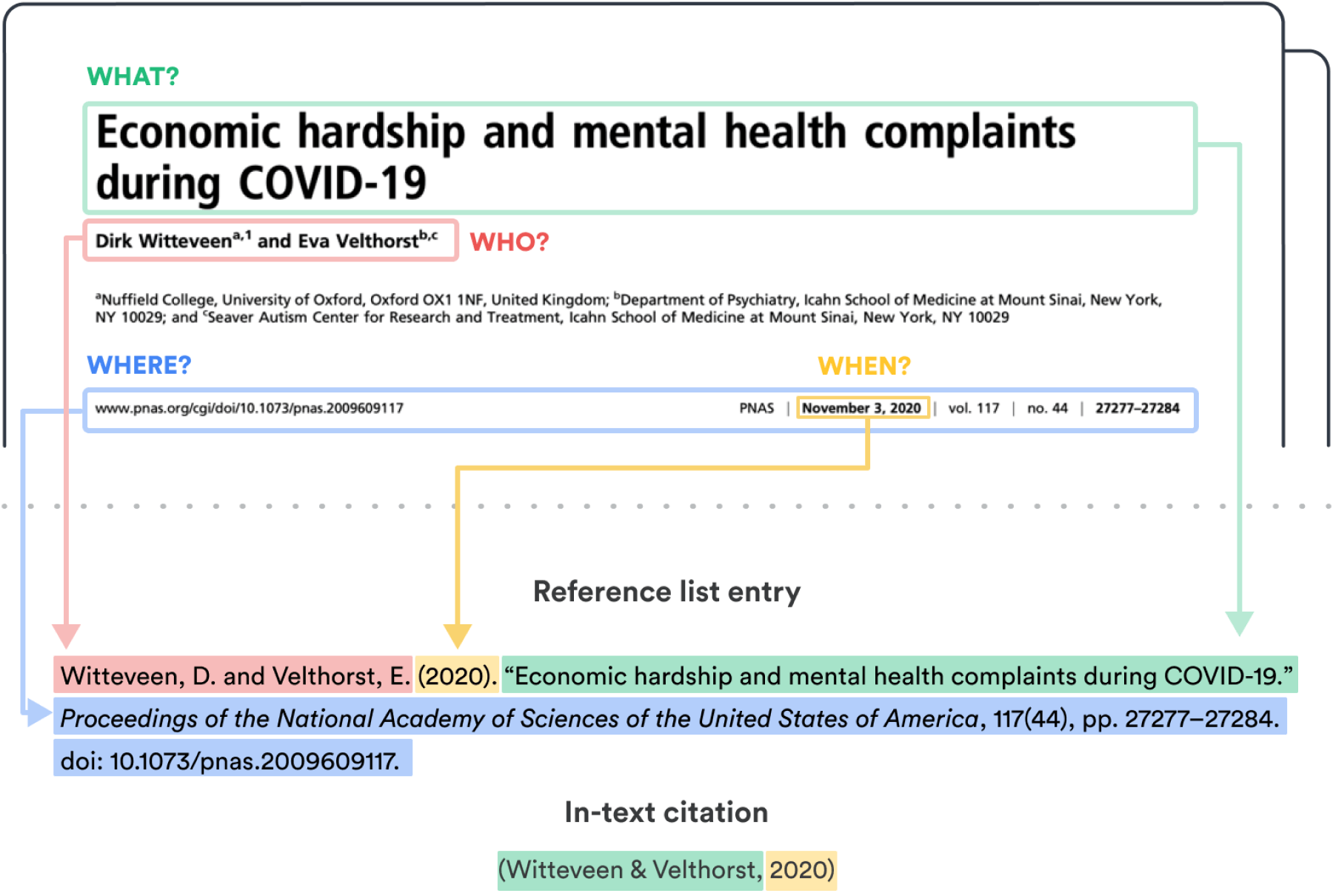
How to use Bibguru for Harvard citations

- Printed books
- Journals and Magazines
- Webpages and Websites
- United Kingdom Legal Sources
The general referencing order for a book in Harvard for your reference list is:
- Author/editor
- Year of publication (in round brackets)
- Title (in italics)
- Place of publication: Publisher
- Series and volume number (where relevant)
EXAMPLE Book with one author
All of those factors contribute to climate change (See, 2012).
Reference list
See, M. (2012) Greenhouse gas emissions: Global business aspects . Berlin, Germany: Springer.
EXAMPLE Book with two authors
Auerbach and Kotlikoff (1998) explain that a higher level of labor productivity means more output per person.
Auerbach, A. J. and Kotlikoff, L. J. (1998) Macroeconomics: An integrated approach. 2nd ed. London, England: MIT Press.
EXAMPLE Book with an editor and multiple authors
.. as claimed by the authors (Raab et al., 2015).
Raab, M. et al. (eds.) (2015) Performance psychology: Perception, action, cognition, and emotion . San Diego, CA: Academic Press.
EXAMPLE Ebook
.. as claimed by the authors (Christian and Griffiths, 2016).
Christian, B. and Griffiths, T. (2016) Algorithms to live by: The computer science of human decisions. London, England: William Collins. Available at: http://a.co/7qGBZAk.
Many journals have print and online equivalents, or they may just be available in print or in online editions. You should reference the version that you are using. As long as the journal reference provides enough bibliographic information for the article to be located by the reader, other elements - e.g. database title or URL - don't need to be included. However, if the article you are citing is only available online, you have to include the DOI or URL.
The general referencing order for a journal article in Harvard is:
- Author (surname followed by initials)
- Title of article (in single quotation marks)
- Title of journal (in italics - capitalise first letter of each word in title, except for linking words)
- Issue information (volume (unbracketed), and, where applicable, part number, month or season)
- Page reference (if available)
- If accessed online: DOI or Available at: URL (Accessed: date)
EXAMPLE Journal article
In their review of the literature (Norrie et al. , 2012)..
Norrie, C. et al. (2012) 'Doing it differently?' A review of literature on teaching reflective practice across health and social care professions', Reflective Practice , 13(4), pp. 565-578.
EXAMPLE Journal article with DOI
(McCauley and Christiansen, 2019)
McCauley, S. M. and Christiansen, M. H. (2019) “Language learning as language use: A cross-linguistic model of child language development,” Psychological review , 126(1), pp. 1–51. doi: 10.1037/rev0000126.
Magazine articles
To cite a magazine article in Harvard, follow this citation order:
- Title of magazine (in italics - capitalise first letter of each word in title, except for linking words)
EXAMPLE Electronic magazine article
The southern part of Kalahari has characteristics of a dry savanna ecosystem (Joubert, 2021).
Joubert, L. (2021) 'Rising heat puts the Kalahari’s ecosystem on the edge of survival', National Geographic, 27 July. Available at: https://www.nationalgeographic.com/magazine/article/rising-heat-puts-the-kalaharis-ecosystem-on-the-edge-of-survival-feature (Accessed: 28 July 2021).
The citation order for theses is the following:
- Year of submission (in round brackets)
- Title of thesis (in italics)
- Degree statement
- Degree-awarding body
EXAMPLE Doctoral thesis
Pradhan, S. (2021) Impacts of road construction on landsliding in Nepal. Doctoral thesis. Durham University. Available at: http://etheses.dur.ac.uk/14069/ (Accessed: 28 July 2021).
When referencing information from the internet, make sure to distinguish what you are referring to. The internet is made up of a broad range of material - from journal articles to government publications, blogs, and images. This section shows you how to reference internet sites or web pages produced by individuals or organisations.
As always, the information you provide should be just enough for the reader to find the source. As material on the internet can be removed or changed, also note the date when you have accessed the information.
The defining element in referencing a website is the URL. It should be included in your reference list, but not in your in-text citation.
Citation order of a website with individual authors:
- Year that the site was published/last updated (in round brackets)
- Title of web page (in italics)
- Available at: URL (Accessed: date)
EXAMPLE Websites with individual authors
McCarthy (2021) also says that wasted food significantly impacts climate change.
McCarthy, S. (2021) Over 1 Billion Tonnes More Food Being Wasted Than Previously Estimated, Contributing 10% of All Greenhouse Gas Emissions. Available at: https://www.worldwildlife.org/press-releases/over-1-billion-tonnes-more-food-being-wasted-than-previously-estimated-contributing-10-of-all-greenhouse-gas-emissions (Accessed: 27 July 2021).
EXAMPLE Websites with organisations as authors
After identifying symptoms (National Health Service, 2018)...
National Health Service (2018) Check your symptoms . Available at: http://www.nhsdirect.nhs.uk/checkyoursymptoms (Accessed: 17 October 2018).
EXAMPLE Websites with no authors
.. and is considered a virtue (Altruism, 2021).
Altruism (2021) Wikipedia, The Free Encyclopedia . Available at: https://en.wikipedia.org/wiki/Altruism (Accessed: August 24, 2021).
Blogs and Vlogs
Beware that blogs and vlogs are someone's opinion, and therefore might not provide objective, reasoned discussion of an issue. Use them together with reputable sources. This is the citation order for blogs:
- Title of message (in single quotation marks)
- Title of internet site (in italics)
- Day/month of posted message
EXAMPLE Blog
Social channels help us share common interests (Liegl, 2021)
Liegl, J. (2021) 'Communicating with humanity', Several People Are Typing , 2 July. Available at: https://slack.com/intl/en-at/blog (Accessed: 28 July 2021).
Social Media
This would be the citation order for an Instagram post, but other social media websites follow the same order:
- Author (Instagram account holder/poster)
- Year posted (in round brackets)
- Title of post (in single quotation marks)
- [Instagram]
EXAMPLE Instagram post
.. by painting a sea horse (VeganArtShare, 2021).
VeganArtShare (2021) 'Tiny dancer of the sea.' [Instagram]. 25 June. Available at: https://www.instagram.com/p/CQjWYSWJDqT/ (Accessed: 24 August 2021).

Photographs
To reference a photograph from the internet, follow this citation order:
- Photographer
- Title of photograph (in italics)
EXAMPLE Photograph from the internet
His beautiful photograph (Kitto, 2013)...
Kitto, J. (2013) Golden Sunset. Available at: http://www.jameskitto.co.uk/photo_1827786.html (Accessed: 14 June 2018).
Television programmes
When viewing a television programme through a streaming service (e.g. Netflix), use the following citation order:
- Title of programme (in italics)
- Year of original broadcast (in round brackets)
- Name of transmitting channel
- Date and time of transmission (if available)
- Available at: Name of streaming service (Accessed: date)
EXAMPLE Programme on Netflix
While this show is set in the Cold war era ( The Queen's Gambit , 2020),..
The Queen's Gambit (2020) Netflix Original, 12 January, 20:00. Available at: Netflix (Accessed: 24 August 2021).
There is a multitude of different legal sources in the UK that we can use to explain referencing in Harvard. The safest way to get the correct reference is to use the BibGuru Harvard reference generator .
This is the citation order for papers from the House of Commons and House of Lords:
- Parliament. House of ...
- Year of Publication (in round brackets)
- Paper number (in round brackets) - for House of Lords papers, the paper number is also in round brackets to distinguish it from identical House if Commons paper numbers
EXAMPLE Papers from the House of Commons and House of Lords
Parliamentary reports for the year included the criminal justice system (Parliament. House of Commons, 1999) and renewable energy (Parliament. House of Lords, 1999).
Parliament. House of Commons (1999) Criminal Justice: working together, Session 1999-2000 . (HC 1999-2000 29). London: The Stationery Office.
Parliament. House of Lords (1999) Electricity from renewables: first report from the Select Committee on the European Union . (HL 1999-2000 (18)). London: The Stationery Office.
While there is a multitude of details and specific rules on how to cite various publications or works in Harvard (magazines, online books, the internet, social media, legal sources, movies, etc.), you do not need to worry about getting your citations wrong with BibGuru. Use our BibGuru Harvard reference generator to create the fastest and most accurate Harvard citations possible.
Ditch the frustrations for stress-free citations
From our blog.
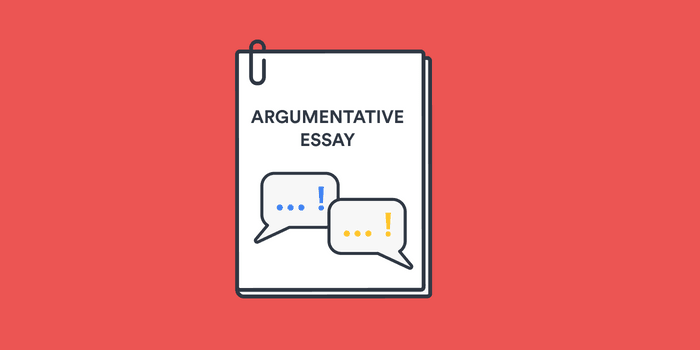
More Bibguru Harvard guides

General Guides (UK)
- Dundalk Institute of Technology Library
- Anglia Ruskin University Library
- University of York Library
- Birmingham City University Library
- University College, London Library
- Imperial College, London Library
- University of Bolton
General Guides (Australia)
- Macquarie University Library
- Monash University Library
- University of New South Wales
Cite Them Right Specific Guides
- Open University Library
- University of Sheffield Library
- University of St. Andrews Library
- University of Sussex Library
The APA style is a variant of the Harvard style. Both styles use author-date references in brackets right after the borrowed information or at the end of the sentence, and full references in the reference list. There are a few differences between APA and Harvard, you can learn more about them here .
Your Harvard paper should be double-spaced with smooth left margins. The Harvard Reference list is double-spaced too.
The Reference list is alphabetised by the author's surname and is double-spaced with a hanging indent, meaning that all but the first line have an indent. The margin can vary depending on your institution, but in general is 0.5.
In general, numbers below 101 should be spelled out. The same goes for large round numbers like "one thousand" or "twenty thousand", although 250,000 would be too long to spell out. Very large numbers, like 4.3 billion, should be expressed in figures. What is most important though is consistency. However, you choose to express numbers, be consistent with them throughout your paper. You can read more about this here .
The Harvard citation style uses the author-date system for in-text references, which means the author's surname and the year of publication in round brackets are placed within the text, not in footnotes. Only use footnotes within a Harvard formatted paper for explanatory notes that would not detract from the text, if necessary.
Citation generators
Citation guides, alternative to.
- NoodleTools
- Getting started
- 📚 How to write a book report
- 📝 APA Running Head
- 📑 How to study for a test

Harvard Referencing Generator
The Harvard Reference generator will quickly & automatically both create and format your citations in the Harvard Referencing style. All you need to do is enter the details of the source you wish to cite and the generator will then do the hard work for you. There’s no registration required! And it’s FREE!
Please choose one of the Harvard referencing styles below and then enter the requested information to have your Harvard reference automatically generated for you.
Once it’s generated, you can simply copy and paste it in to your essay. You’ll never need to worry or waste time referencing again!

Reference a book A written work or composition found in print, or digitally as an e-book. Can be non-fiction or fiction.
Reference a chapter of a book
A chapter from a written work or composition found in print, or digitally as an e-book. Non-fiction or fiction.

Reference a journal article
A scholarly work published periodically, containing highly specified research.

Reference a website
A collection of pages that provides information about a certain topic.
Reference an email
A written communication sent over electronic mail (email).
The purposes and benefits of the Harvard Referencing Generator.
The types and differences of the harvard referencing generator., the book reference tool, the chapter reference tool, the journal article reference tool, the website reference tool, the email reference tool, contact us at.
- e-mail: info@theunitutor.com
- tel: +44 20 3286 9122

Brought to you by SiteJabber

- Terms & Conditions
- Privacy Policy
Copyright © 2002-2024 - The Uni Tutor - Custom Essays. 10347001, info@theunitutor.com, +44 20 3286 9122 , All Rights Reserved. - Terms and Conditions | Privacy Policy
The Uni Tutor : We are a company registered in the United Kingdom. Registered Address London, UK , London , England , EC2N 1HQ

- Plagiarism and grammar
- Citation guides
Citation Machine® — Write Smarter
Start a new citation or manage your existing bibliographies.
Scan your paper for plagiarism and grammar errors.
Check your paper for grammar and plagiarism
Catch plagiarism and grammar mistakes with our paper checker
Use Citation Machine® Plus to get smart recommendations!
Scan your paper for unintentional plagiarism and get advanced recommendations for sentence structure, writing style, grammar and more!
- expert check
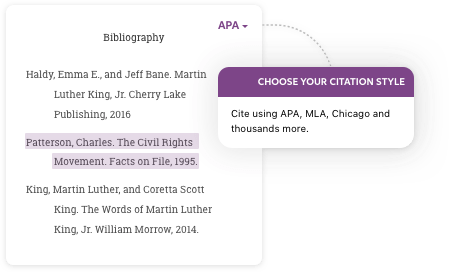
Know you're citing correctly
No matter what citation style you're using (APA, MLA, Chicago, etc.) we'll help you create the right bibliography
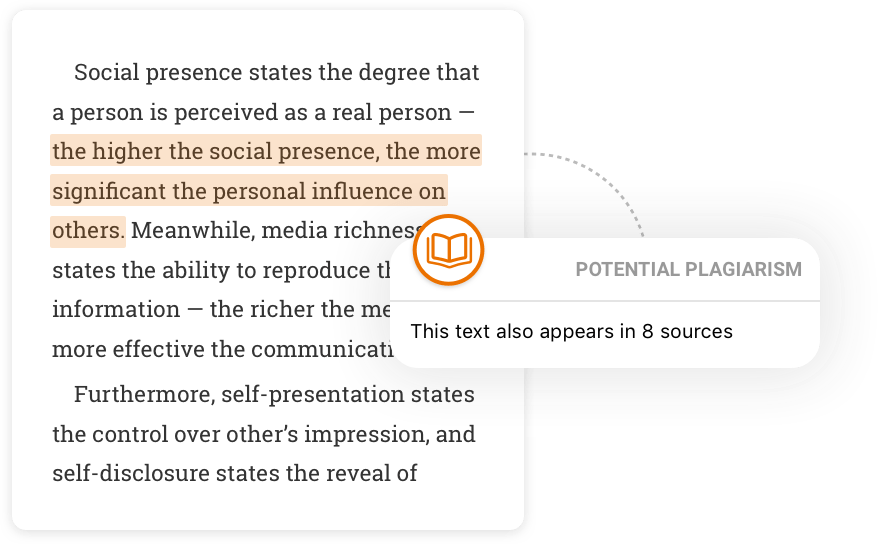
Check for unintentional plagiarism
Scan your paper the way your teacher would to catch unintentional plagiarism. Then, easily add the right citation
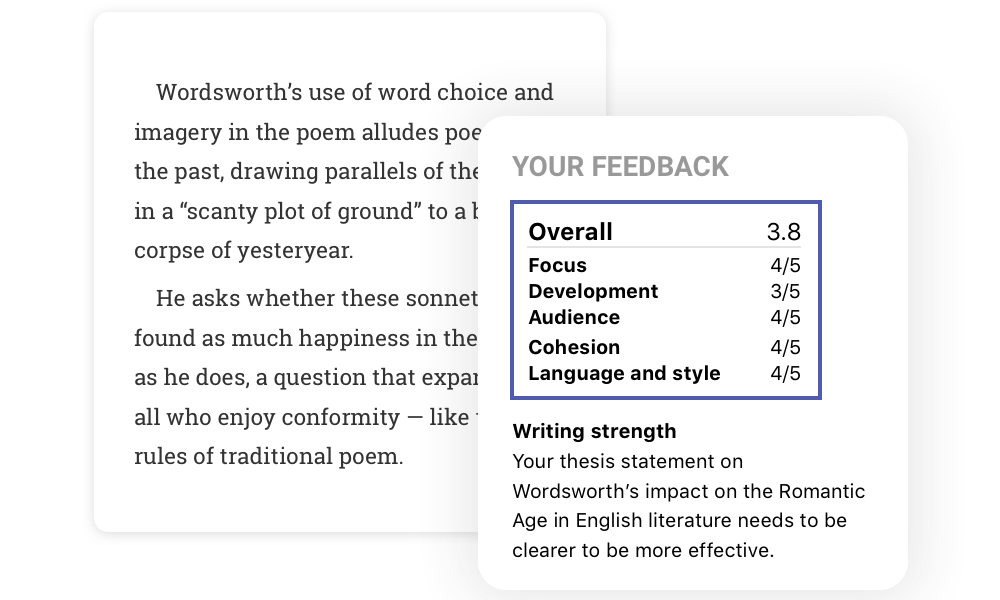
Strengthen your writing
Give your paper an in-depth check. Receive feedback within 24 hours from writing experts on your paper's main idea, structure, conclusion, and more.
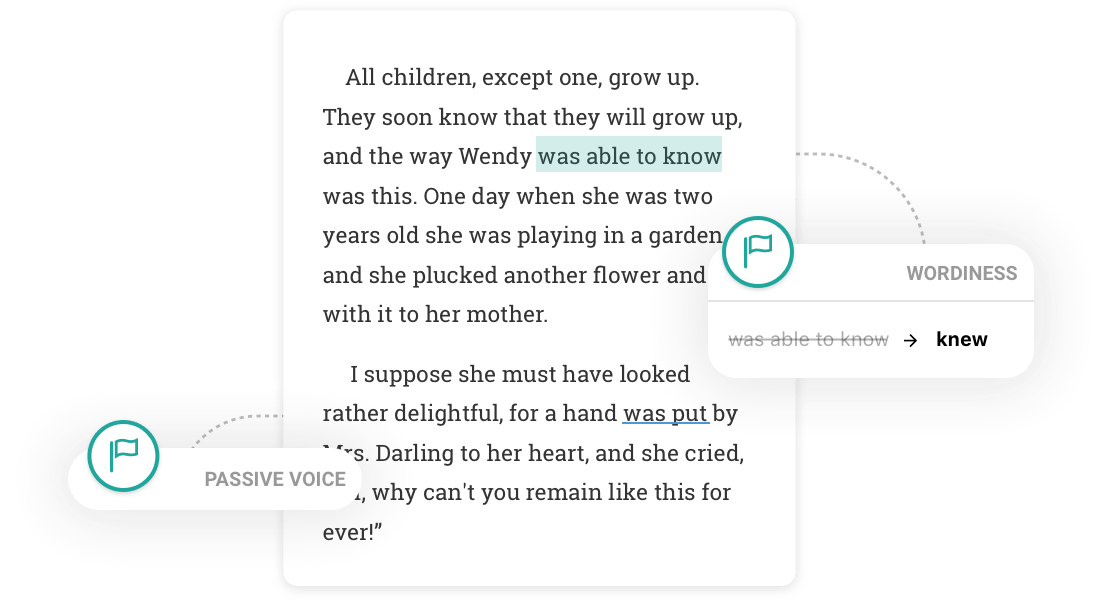
Find and fix grammar errors
Don't give up sweet paper points for small mistakes. Our algorithms flag grammar and writing issues and provide smart suggestions
See what's included with Citation Machine® Plus
Citation machine® guides & resources, mla format: everything you need to know and more.
Filled with a wide variety of examples and visuals, our Citation Machine® MLA guide will help you master the citation process. Learn how to cite websites, books, journal articles, magazines, newspapers, films, social media, and more!
MLA Citation Generator | Website | Books | Journal Articles | YouTube | Images | Movies | Interview | PDFs
Comprehensive Guide to APA Format
Our Citation Machine® APA guide is a one-stop shop for learning how to cite in APA format. Read up on what APA is, or use our citing tools and APA examples to create citations for websites, books, journals, and more!
APA Citation Generator | Website | Books | Journal Articles | YouTube | Images | Movies | Interview | PDFs
Everything You Need to Know About Chicago Style
Creating citations in Chicago style has never been easier thanks to our extensive Citation Machine® Chicago style guide and tools. Learn about footnotes, endnotes, and everything in between, or easily create citations for websites, books, journal articles, and more!
Chicago Citation Generator | Website | Books | Journal Articles | YouTube | Images | Movies | Interview | PDFs
Citation Machine®’s Ultimate Writing Guides
Whether you’re a student, writer, foreign language learner, or simply looking to brush up on your grammar skills, our comprehensive grammar guides provide an extensive overview on over 50 grammar-related topics. Confused about reflexive verbs, demonstrative adjectives, or conjunctive adverbs? Look no further! Learn about these grammar topics and many, many more in our thorough and easy to understand reference guides!
Citing Sources Guide | Grammar Guide | Plagiarism Guide | Writing Tips
Student Blog
Stay up to date! Get research tips and citation information or just enjoy some fun posts from our student blog.
- Citation Machine® Plus
- Citation Guides
- Chicago Style
- Harvard Referencing
- Terms of Use
- Global Privacy Policy
- Cookie Notice
- DO NOT SELL MY INFO

IMAGES
VIDEO
COMMENTS
The Harvard Reference Generator below will automatically create and format your citations in the Harvard Referencing style. Simply enter the details of the source you wish to cite and the generator will do the hard work for you, no registration is required! To start referencing select the type of source you want to reference from the options below:
Enter the URL, DOI, ISBN, title, or other unique source information to find your source. Click the 'Cite' button on the reference generator. Copy your new citation straight from the referencing generator into your bibliography. Repeat for each source that has contributed to your work. *If you require another style for your paper, essay or ...
Referencing your sources is important because it: The most common citation styles in the UK are APA, MLA, Harvard, Vancouver, MHRA, and Oscola. Each citation style has specific rules for formatting citations. Scribbr's free Reference Generator can generate perfect references and in-text citations in both APA and MLA styles.
There are many versions of Harvard referencing style. Our guidance reflects the rules laid out in Cite Them Right: The Essential Referencing Guide (12th edition) by Richard Pears and Graham Shields. Scribbr's free reference generator can create flawless Harvard style references for a wide variety of sources. Cite a webpage.
Professional Referencing Services. If you are finding difficulties with referencing your essay and are looking for a professional research and referencing service then any of our writing services include this as standard. Take a look at our Essay Writing Service for more information: Essay Writing Service PRO
APA Style is widely used by students, researchers, and professionals in the social and behavioral sciences. The Scribbr APA Reference Generator automatically generates accurate references and in-text citations for free. This referencing guide outlines the most important referencing guidelines from the 7th edition APA Publication Manual (2020).
Click the button "Create citations" to begin. You'll be prompted to choose a source type and guided through the rest of the citing process. For source types like websites, journal articles, and books, the Cite This For Me™ citation generator automatically tries to find your source's information based on details you provide.
A Harvard Referencing Generator is a tool that automatically generates formatted academic references in the Harvard style. It takes in relevant details about a source -- usually critical information like author names, article titles, publish dates, and URLs -- and adds the correct punctuation and formatting required by the Harvard referencing style.
The Cite This For Me Harvard referencing generator above will create your references in the Harvard - Cite Them Right (10th Edition) format as standard, but it can auto-generate references in 7,000+ styles. So, whether your professor has asked you to adopt APA referencing, or your discipline requires you to use OSCOLA referencing, Vancouver ...
This referencing system is called the author-date system. The in-text citations are followed by a full, alphabetised list of references in an end section. We will explain this in further detail below with plenty of examples. Citing can be very complex, which is why we have created the BibGuru Harvard reference generator to help you focus on the ...
Generate APA References quickly, easily and for free. The APA Reference Generator below will automatically create and format your citations in the APA Referencing style. Simply enter the details of the source you wish to cite and the generator will do the hard work for you, no registration is required! To start referencing select the type of ...
Here's The Uni Tutor's very own Harvard Referencing Generator - use it to save you time when you're creating Harvard Citations for your essay or thesis. Guaranteed by PayPal #2 Essay Site on Sitejabber. [email protected] +44 20 8638 6541. Menu. ... UK Essay Writing; Custom Essays;
Citation Generator: Automatically generate accurate references and in-text citations using Scribbr's APA Citation Generator, MLA Citation Generator, Harvard Referencing Generator, and Chicago Citation Generator. Plagiarism Checker: Detect plagiarism in your paper using the most accurate Turnitin-powered plagiarism software available to ...
Our Harvard Referencing Generator is a free tool that allows users to automatically create Harvard Website References. No registration required! ... See How UK Essays Can help You! Our Services. Genuine Reviews. Your UKEssays purchase is secure and we're rated 4.4/5 on reviews.io. Bespoke.
College-level and post-graduate students are most likely to use an APA citation generator, because APA style is the most favored style at these learning levels. Before college, in middle and high school, MLA style is more likely to be used. In other parts of the world styles such as Harvard (UK and Australia) and DIN 1505 (Europe) are used more ...
Stay up to date! Get research tips and citation information or just enjoy some fun posts from our student blog. Citation Machine® helps students and professionals properly credit the information that they use. Cite sources in APA, MLA, Chicago, Turabian, and Harvard for free.
The Scribbr Reference Generator is developed using the open-source Citation Style Language (CSL) project and Frank Bennett's citeproc-js. It's the same technology used by dozens of other popular citation tools, including Mendeley and Zotero.
6. Edition. Enter the edition number of the book. You can leave this blank if it is 1st / first or if you do not know the edition. Click the button below to generate your Harvard Book Reference and In-line Citation. Don't worry, you can come back and edit the reference if you need to correct or add any information.
Uk Essay Reference Generator. Absolute Anonymity. offers three types of essay writers: the best available writer aka. standard, a top-level writer, and a premium essay expert. Every class, or type, of an essay writer has its own pros and cons. Depending on the difficulty of your assignment and the deadline, you can choose the desired type of ...
Here are some useful features that make our free essay generator worthy: Generate Essay in Seconds This essay generator is an AI that writes essays in seconds which helps you out from the trisomy job of writing essays manually. Free to Use Our AI essay writer is completely free to use. It means that you can write compelling and effective essays ...
Our APA Website Reference Generator is a free tool that allows users to automatically create APA References for pages on the World Wide Web. ... See How UK Essays Can help You! Our Services. Genuine Reviews. Your UKEssays purchase is secure and we're rated 4.4/5 on reviews.io. Bespoke.
The Vancouver Reference Generator below will automatically create and format your citations in the Vancouver Referencing style. Simply enter the details of the source you wish to cite and the generator will do the hard work for you, no registration is required! To start referencing select the type of source you want to reference from the ...